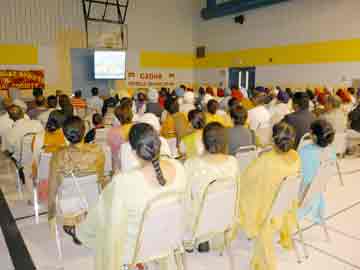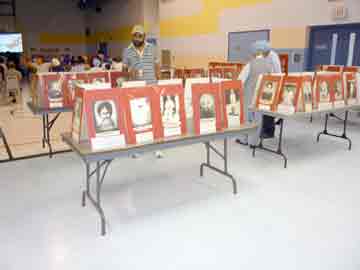
Archive 2009
|
October 16-31, 2009
Centenary of the martyrdom of Madan Lal Dhingra commemorated in Toronto
Madan Lal Dhingra was part of a whole generation of youth who revolted against colonial rule and dedicated their life to free India from colonial slavery. The vigorous participation of so many people, young and old, women and men, in this function, showed once again that in the hearts of the Indian people resident in Canada, there is a burning desire to carry forward the revolutionary traditions of the past, and contribute to the building of an India that they can truly be proud of, an India free from all forms of exploitation and oppression.
A few days before his hanging Dhingra said, "I believe that a nation held down by foreign bayonets is in a perpetual state of war. Since open battle is rendered impossible to a disarmed race, I attacked by surprise. Since guns were denied to me I drew forth my pistol and fired. Poor in health and intellect, a son like myself has nothing else to offer to the mother but his own blood. And so I have sacrificed the same on her altar. The only lesson required in India at present is to learn how to die, and the only way to teach it is by dying ourselves. My only prayer to God is that I may be re-born of the same mother and I may re-die in the same sacred cause till the cause is successful. Vande Mataram!" The program began with Comrade Gurdev welcoming the gathering. He pointed out that this event was a continuation of revolutionary traditions among the people of Indian origin in Canada. Over a century ago, Indian immigrants in North America began organizing such programmes in defence of the dignity and honour of their people and to free India from the yoke of the British colonialists. Many Indians from Canada, US and Britain became active fighters in the Ghadr movement, a movement for the liberation of India from colonial yoke. Independence of India from British rule meant that colonial rule had ended. However, as developments of the past 62 years have shown, the colonial legacy including capitalism and imperialist plunder continues in India, wreaking disaster on the vast masses of Indian people, even while a big bourgeois minority has grown enormously rich and is striving to be a global imperialist power. This was not what the revolutionaries of the anti colonial movement fought for. The Ghadr movement has therefore continued in the conditions of post colonial India, and we revolutionary Indians living abroad will continue to work for the liberation of India from capitalism and the colonial legacy. Comrade Gurdev’s remarks were met with vigorous applause, with his speech setting the tone for the meeting. Next, Shingara Samra, who is connected to Punjabi theatre, sang an inspiring song titled “Salute to the Martyrs.” His song portrayed that a majority of people think that the dreams of our martyrs have not been fulfilled and by continuing the struggle, we need to achieve their dreams. After this, a comrade gave a brief description of a documentary of the 1857 Ghadr, one of the greatest battles against the British colonialists. He pointed out that the colonialists as well as the Indian rulers who followed them have deliberately distorted and underplayed the significance of the 1857 war of independence. Elaborating on the documentary, he said it gives a message to continue this Ghadr of 1857 so that a new society can be created. He also assured that this documentary film will be dubbed in Punjabi and other languages so that the reality of this historic event of immense proportions could reach all of the masses. A representative of the CUPE union of York University, Raj Virk, spoke about their long strike struggle. He said the members of the local union who are PhD students and Teaching Assistants, are very seriously concerned about their job security. They work on temporary basis and are the victims of the present economic crisis and ruthless capitalist exploitation. PhD’s and highly educated professors have no job security and are being exploited. University’s full-time jobs are decreasing, while contractual jobs are increasing. He said that the government suppressed the strike by force, exposing that it was a government of the capitalist class and totally anti-worker. The union has filed a complaint against the government to the International Labour Organization (the ILO, a body of the United Nations). The next paper was read by a promising writer and a literary figure of the Indian community in Canada, Kulwinder Khera. His paper was on the life and struggles of Madan Lal Dhingra. Azeem Mohammad, a veteran Pakistani activist, currently working for his Ph D in Law at York University denounced the NATO forces, which under the guise of ‘crushing terrorism’ have been causing devastation both in Pakistan and Afghanistan. He talked about the treacherous role played by successive Pakistani rulers to paint the tragedy of the 1947 partition as some great victory. He spoke of how the people of Pakistan today, are paying the price for the unjust event forced upon the people of the region by the imperialists and the Pakistani rulers. “The struggle waged by the people of Pakistan is confirmation of the same struggle started by the Ghadrites”, he said. “We had one country before 1947, and there are two countries now, but our fight in defence of our rights against our common enemy is one”. People listened very attentively to Azeem’s presentation. Onkarpreet said that we should not look at the situations from the surface but analyse them thoroughly and seriously. He presented a moving poem. A couplet from that poem said “Dreaming of democracy and a just society, many people before went to the gallows; the democracy that people are living in today is sending those dreams of the martyrs to the gallows”. Listening to the above lines, the audience responded with much applause. Joginder S. Grewal, founder of Panj Pani Newspaper, in a brief speech, said that it is encouraging to see the lives of people who sacrificed their lives for their people, and who have been forgotten, commemorated here. He further said that the monument set up in the memory of Madan Lal Dhingra, in Amritsar, is in very poor and bad shape. He said that we the people of India should unite as one and not fall prey to divisions on the basis of caste or creed. In the end, Dr. Baljinder Sekhon presented his paper, “Ghadr Movements in Present Conditions”. He briefly talked about the Ghadr party and how its aim was to construct Socialism in India. He said that religion as defined by the Ghadri Babas was patriotism, and not the formal worship of this or that god. Dr. Sekhon’s presentation took the form of a slideshow. Through graphs and figures, he showed how, under capitalism, the life and livelihood of people is deteriorating day by day. Wall Street has swallowed the ordinary street, and a common man has lost his money or savings, and not the rich in this present economic crisis. He said the Indian ruling classes beagn on the course of liberalisation, privatisation and globalisation in 1991, under the pretext that India will make progress. What has happened is that while some people got rich and prospered, a large number of people’s conditions became worse. He said the government of Punjab says that there is no need for agriculture in Punjab. The number of professors in one of the agricultural universities has been cut from 1200 to 700. People present at the meeting actively listened to Dr. Sekhon’s presentation. Messages of solidarity were read. A message from CGPI was read out to the people, and then Comrade Gurdip from Winnipeg read a message from the Manitoba branch of CPC-ML. He upheld the fighting traditions of the Indian people for the defence of their rights. After this, a question and answer session was held. The hall was decorated with pictures of the Ghadri Babas, and people showed a keen interest in the exhibition. People also purchased progressive literature. In the end, Comrade Gurdev thanked people for coming to the programme, and the programme concluded in a very lively atmosphere. |


